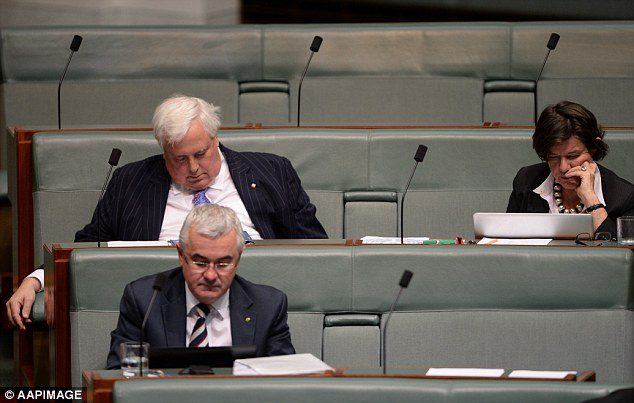In the middle of a week that sunk another sitting prime minister, the challenger, Peter Dutton, fell into an archetypal breakfast FM radio interview trap: he couldn’t name his favourite AC/DC song.
Dutton blamed it on a lack of sleep. “Mate, this is the one where it catches you out,” a seemingly self-aware Dutton told Melbourne’s Triple M Breakfast. “I’ve had about an hour and a half sleep last night.”
Furtive walks are taken around Parliament House with trusted allies or fraught friends as soon as the pre-dawn haze outlines Mt Ainslie. All the serious operatives are well and truly awake in time for early “AM” on ABC radio. In a Sitting Week, there’s every chance a cabinet minister has clocked a nine-hour day by the time Question Time starts at 2pm.
Nor does the work stop when the houses rise. It can quite easily run into the early hours. Staffers are hardly surprised to find emails waiting from their politician bosses sent through the night.
So it was no surprise Dutton was running near on empty in that mad week that called it quits on the Turnbull experiment but saw Dutton left by the wayside, a victim of bad planning and even worse execution.
This question of how sleep and politics interacts isn’t an original one. Fleur Anderson spent 15 years in the Press Gallery, forever wanting to ask Australian leaders how they could switch off and sleep at night. Anderson left the The Australian Financial Review last year and finally did ask.
On Sleep, published by Melbourne University Publishing last month, sees Anderson chart the fraught relationship between the political life and sleep. She asks Kevin Rudd, John Howard and Julie Bishop how they could sleep at night despite the pressure of their jobs.
Rudd acknowledges the media image of his sleeplessness but maintains he tries to get six hours’ sleep a night at minimum. (There would certainly be some public service veterans from his time in government who would disagree.)
So why was Dutton – a man who was looking to clinch the prime ministership – getting by on 1.5 hours?
Anderson points out that the parliamentary sitting calendar was once far worse, often sitting beyond midnight. Whitlam, who went back to the Lodge for a steak after being dismissed in 1975 before telling parliament, was clearly someone who thought politics needed times of rest and contemplation in periods of crisis. He introduced more order to parliamentary proceedings.
But, as Anderson points out, while adults were getting around 8.5 hours of sleep a night in the 1960s, we’re now getting 6.8 hours a night. Is the internet keeping us up? Did electric light permanently disrupt our circadian rhythms? What effect is all this having on our politics and our ability to think?
Student politics, which has an unfortunate habit of setting precedents for how a whole generation of politicians can be expected to behave, is no longer confined to the campus. Campaigns run well into the night, featuring co-ordinated Facebook profile photos, Tinder campaigning and comment thread feistiness.
Separated from reality, politics can continue in unhinged digital playgrounds. There’s no time to sleep when another vote can be clinched for your campaign as a second-year to serve as a general representative.
It looks like we’re setting a dangerous precedent. Why let your competitors get an advantage? If someone’s going to work through the night and get an edge, everyone will be forced to by default.
No wonder Dutton was barely catching a wink.
And there’s another thing that federal and student politics shares: allegations of bullying.
The results of a 2014 study of French school children “suggest a higher vulnerability of bullies to sleep deprivation.” The same found sleep could have a “a moderating effect on aggression in bullies.”
No time to think, no time to sleep, and bullies potentially emboldened by their lack of sleep in the hothouse of politics: a miserable, detrimental, unnecessary combination.
However, maybe there is a clear argument for legislating a sleep requirement. Maybe – just maybe – it would have calmed the stupidity of another leadership spill. Surely if there’s a political advantage to sleep, it’ll be taken up?
Unlikely. Events run late and meetings start early. The risk of self-absorption comes with the territory – so caught up in the business of day and night politicking, there’s little time left to effectively govern.
It led to all those sleepless nights for a Liberal party in the throes of its own discontent – and for what?
It wasn’t to shore up election chances. A swing of 30 per cent against the NSW Liberals at a state by-election last week cost a seat held by the party since 1957. Wagga Wagga went independent. The NSW Liberals had their own problems – but the behaviour of their federal party colleagues certainly didn’t help. It doesn’t bode well.
With no apparent concern for their electoral future, the Liberal party displayed all of its tired ideological ugliness, beamed around the country in real time by the eager journalists kept on standby in that maddening building on the Hill. This was about no one but themselves.
The best interests of Australians certainly weren’t at heart – and it looks like Australians won’t have the interests of the Liberal party at heart when they vote at the next election.
As Alan Ramsey would say, “Nothing changes.”
Jasper Lindell is Woroni’s political columnist and a former news editor
We acknowledge the Ngunnawal and Ngambri people, who are the Traditional Custodians of the land on which Woroni, Woroni Radio and Woroni TV are created, edited, published, printed and distributed. We pay our respects to Elders past and present. We acknowledge that the name Woroni was taken from the Wadi Wadi Nation without permission, and we are striving to do better for future reconciliation.
